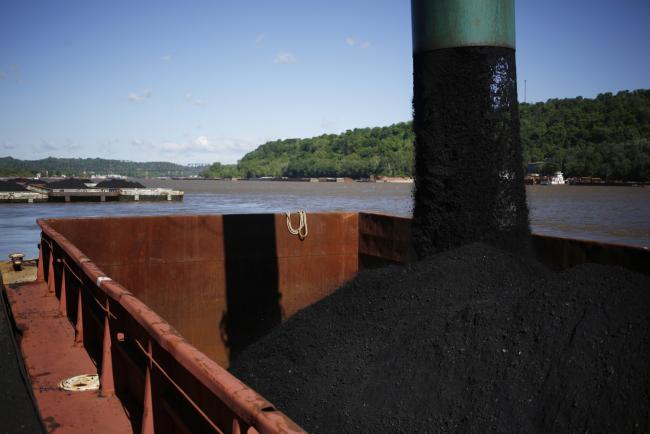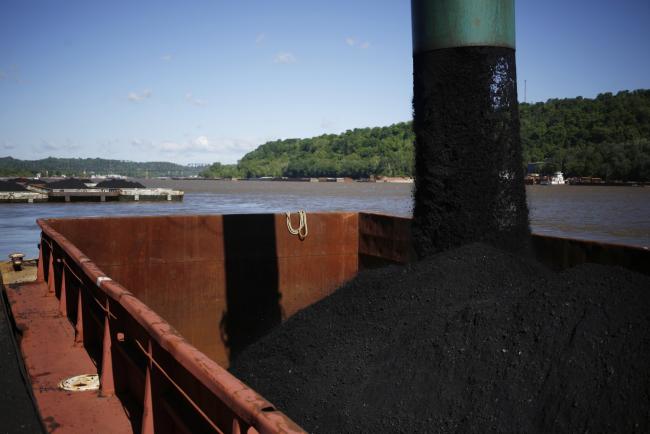(Bloomberg) -- The Trump administration is pushing back against assertions it buried a study that undermines its efforts to prop up coal and nuclear power plants.
The analysis, which was initially ordered up by the Energy Department’s Office of Nuclear Energy last fall and completed earlier this year, is still moving through an internal review process, spokeswoman Shaylyn Hynes said.
“It is premature and irresponsible to criticize and jump to politically motivated conclusions about a report that has not yet been finalized or released,” Hynes said by email.
The study disputes a key Trump administration argument for preventing the closures of more coal and nuclear power plants: that those facilities are critical in ensuring the nation’s electric grid is resilient because they store their fuel on site. Such “fuel-secure” facilities play a vital role in keeping electricity flowing because they aren’t dependent on natural gas from pipelines that can be disrupted, wind that keeps blowing or a sun that sets at night, administration supporters say.
But the analysis, conducted by the University of Texas’s Webber Energy Group, says that on-site fuel is only one factor in judging the resilience and reliability of power generators. Other factors include how quickly plants can ramp up and down, the percentage of time they can generate electricity and how they help stabilize the frequency of the grid.
“There’s no one fuel-technology combination that’s all bad or all good,” said report author Michael Webber, the deputy director of the University of Texas at Austin’s Energy Institute. “All of the fuels and technologies have some value for resilience and some vulnerability.” When it comes to ensuring a resilient electric grid, “there is no one answer; you have to have a suite of options.”
Webber said the report was delivered about six months ago but hasn’t yet seen the light of day.
Government-commissioned reports aren’t always publicized by the agencies that ordered them -- and even when they are, it may take years for them to be published. And that’s true for Republican and Democratic administrations alike.
“It’s not highly unusual for a report to slowly work its way through the system and die from atrophy along the way,” Webber said in an interview. “But this one felt different than these other situations because the urgency” in which it was commissioned “and the pace at which it’s moving seem mismatched.”
Internal Purposes
Hynes stressed that “studies done at the department typically take multiple months and in some cases even years.”
“The purpose of many of these reports is to better inform internal discussions and policy making,” Hynes said. “In fact, many DOE reports are completed for internal purposes only.”
Hynes said the Office of Nuclear Energy asked for the study last fall, requesting that the government’s Idaho National Laboratory evaluate nuclear resilience and baseload capacity needed to maintain grid stability under a variety of scenarios. The study was subcontracted out to the University of Texas, and the Office of Nuclear Energy received the latest draft of the analysis from the Idaho National Laboratory on Sept. 30.
Trump administration officials have been mulling strategies for preserving nuclear and coal-fired power plants that keep fuel on site and provide reliable electricity capable of snapping back after intense storms and emergencies. Energy Secretary Rick Perry proposed a rule that would have compensated coal and nuclear plants for their ability to store months’ worth of fuel on site last year, but federal regulators shot down the idea in January.
Draft Memo
Now, administration officials are considering using authority under the 68-year-old Defense Production Act to force grid operators to buy electricity from specific power plants at risk of closing. Federal intervention is necessary before the U.S. reaches a tipping point in the loss of essential, secure electric generation resources, they argue.
According to an administration draft memo obtained by Bloomberg News, the government also could establish a strategic reserve of critical power generators that could be revved up in case of an emergency. “Too many of these fuel-secure plants have retired prematurely and many more have recently announced retirement,” only to be replaced by less-secure, less-resilient natural gas and renewable power sources, the memo said.

